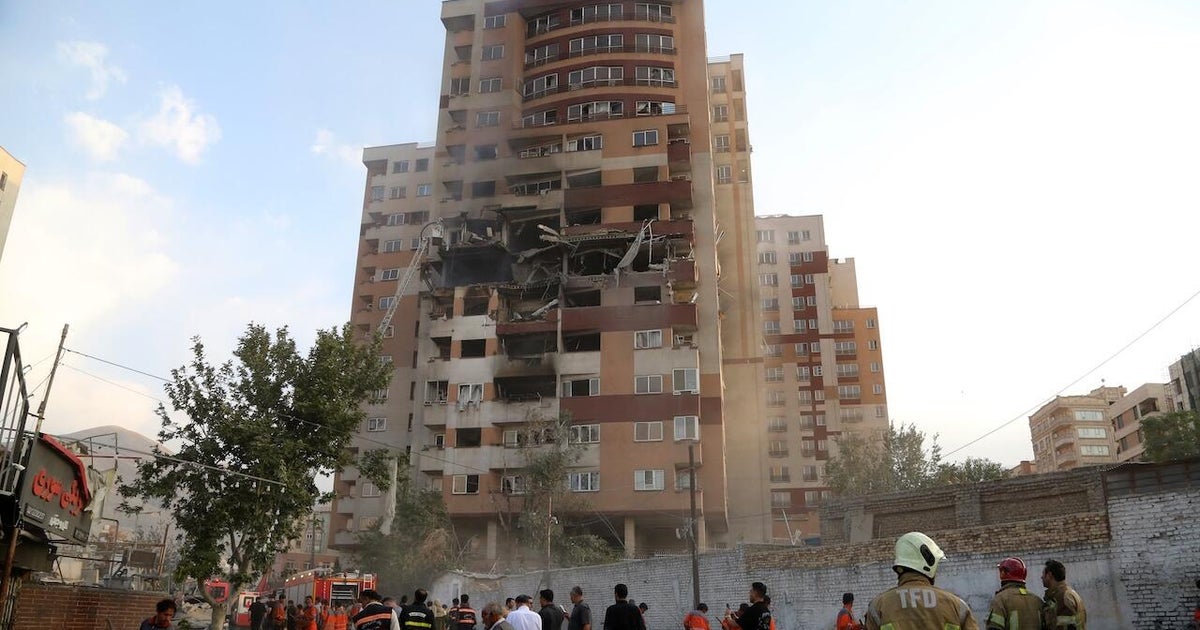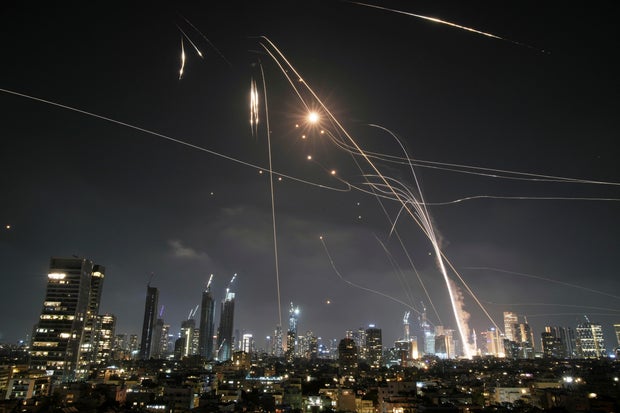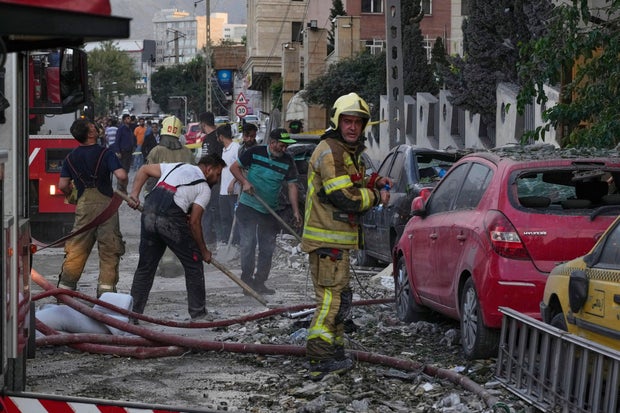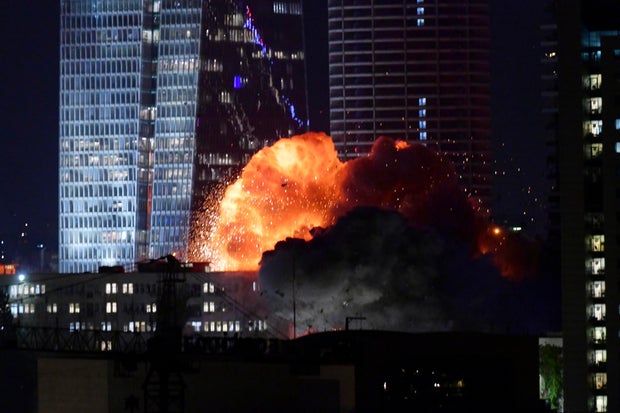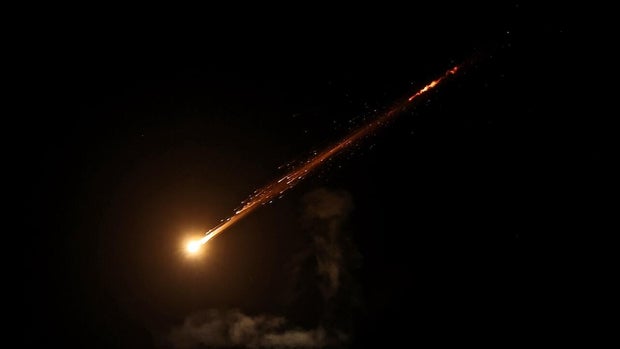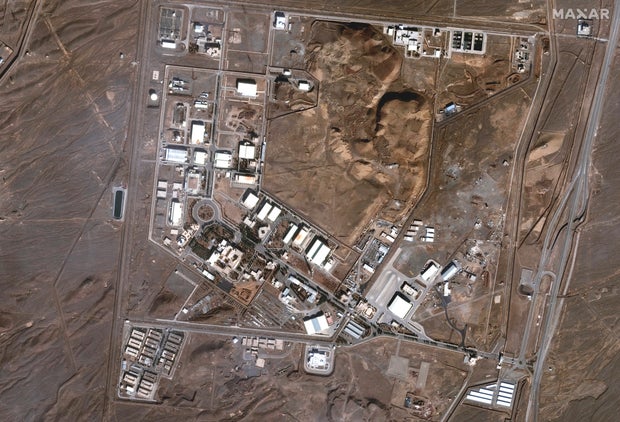Israel’s defense minister warned Saturday that “Tehran will burn” if Iran continues firing missiles at Israel. Iran’s retaliatory strikes come after Israel unleashed a series of blistering attacks on Iran’s nuclear program and armed forces on Thursday. Meanwhile, talks between the U.S. and Iran were called off on Sunday, sources told CBS News.
Speaking after an assessment meeting with the army’s chief of staff, Defense Minister Israel Katz said Iran will pay a heavy price for harming Israeli citizens. At least three people have died in Israel, and dozens wounded, Israel Defense Forces officials said Saturday morning.
Iran’s U.N. ambassador said at least 78 people have died and hundreds have been wounded in Iran from Israel’s strikes.
“If (Iranian Supreme Leader Ayatollah Ali) Khamenei continues to fire missiles at the Israeli home front — Tehran will burn,” Katz said.
Israeli Prime Minister Benjamin Netanyahu confirmed the three civilian deaths in an address Saturday, saying he shares the grief with the families but the nation is thwarting “a double threat” from Iran — nuclear and ballistics missiles — to destroy the State of Israel. He said Israel’s strikes had “inflicted very severe damage on Iran’s central enrichment site.”
Iranian state television reported online that air defenses were firing in the cities of Khorramabad, Kermanshah and Tabriz, signaling the start of what could be a new Israeli attack on Saturday. Footage from Tabriz showed black smoke rising from the city.
An Israeli military official said Saturday that the military was poised to carry out more strikes in Iran, saying, “This is not over.” He spoke on condition of anonymity, in line with official procedures.
Israel’s initial assault used warplanes — as well as drones smuggled into the country in advance, according to officials — to hit key facilities and kill top generals and scientists. Israel’s army said Saturday it killed nine senior scientists and experts involved in Iran’s nuclear project.
“The individuals who were eliminated played a central part of the progress toward nuclear weapons,” the IDF said in a news release. “Their elimination represents a significant blow to the Iranian regime’s ability to acquire weapons of mass destruction.”
Iran retaliated by launching waves of drones and ballistic missiles at Israel, where explosions lit the night skies over Jerusalem and Tel Aviv and shook the buildings below. The Israeli military urged civilians, already rattled by 20 months of war in Gaza sparked by Hamas’ Oct. 7 attack, to head to shelter for hours. U.S. officials confirmed to CBS News that U.S. forces helped Israel intercept Iranian missiles on Friday.
Leo Correa / AP
Both Israel and Iran said their attacks would continue, raising the prospect of another protracted Mideast conflict. Netanyahu said Friday that his objective was to eliminate any Iranian threat to Israel, but he also urged Iranians to rise up against their leaders. Israel would welcome the government’s overthrow even if it is not actively seeking it.
“The time has come for you to unite around your flag and your historic legacy, by standing up for your freedom from an evil and oppressive regime,” Netanyahu said Friday. “It has never been weaker. This is your opportunity to stand up and let your voices be heard.”
Strikes could derail U.S.-Iran nuclear talks
Israel’s ongoing strikes have halted — for now — diplomacy between the U.S. and Iran. Oman’s foreign minister, Badr al-Busaidi, said on social media that talks on Sunday “will not now take place,” but he added that “diplomacy and dialogue remain the only pathway to lasting peace.”
A senior administration officials told CBS News, “While there will be no meeting Sunday, we remain committed to talks and hope the Iranians will come to the table soon.”
Secretary of State Marco Rubio has said the U.S. was not involved in Israel’s initial strike, and that his top priority is protecting American assets in the Middle East. The State Department on Thursday informed multiple U.S.-allied governments in the Middle East in advance of Israel’s strikes on Iran, four sources told CBS News.
Vahid Salemi / AP
President Trump urged Iran on Friday to reach a deal with the U.S. on its nuclear program, warning on his Truth Social platform that Israel’s attacks “will only get worse.”
“Iran must make a deal, before there is nothing left,” he wrote.
Will Todman, the chief of staff of the Geopolitics and Foreign Policy Department and a senior fellow in the Middle East Program at the Center for Strategic and International Studies, told CBS News that Mr. Trump has “put a lot of effort into the nuclear negotiations with Iran,” but “seems to have grown frustrated with the lack of success in those talks.”
“The Iranians tend to negotiate very slowly. And be very slow to make concessions,” Todman said. “And so I think he’s now viewing these military actions by Israel as a way of increasing pressure on Iran to make those concessions and ultimately come to a deal.”
Iranian missiles strike Israel
Khamenei said in a recorded message Friday: “We will not allow them to escape safely from this great crime they committed.”
Iran launched waves of missiles at Israel late Friday and early Saturday. Iranians awoke Saturday to state television airing repeated clips of strikes on Israel, as well as videos of people cheering and handing out sweets. Israel’s military said more drones were intercepted near the Dead Sea early Saturday.
A hospital in Tel Aviv treated seven people wounded in the second Iranian barrage; all but one of them had light injuries. Israel’s Fire and Rescue Services said they were wounded when a projectile hit a building in the city. A spokesperson for Beilinson Hospital said one woman was killed.
Tomer Neuberg / AP
Hours later, an Iranian missile struck near homes in the central Israeli city of Rishon Lezion, killing two more people and wounding 19, according to Israel’s paramedic service Magen David Adom. Israel’s Fire and Rescue service said four homes were severely damaged.
Israel’s main international airport said Saturday it will remain closed until further notice.
Meanwhile, the sound of explosions and Iranian air defense systems firing at targets echoed across central Tehran shortly after midnight. Iran’s semiofficial Tasnim news agency reported a fire at Tehran’s Mehrabad International Airport. A video posted on X showed a column of smoke and flames rising from what the outlet said was the airport.
The Israeli military said it carried out overnight strikes on dozens of targets, including air defenses, “in the area of Tehran.”
Israel’s paramedic services said 34 people were wounded in the barrage on the Tel Aviv area, including a woman who was critically injured after being trapped under rubble. In Ramat Gan, east of Tel Aviv, an AP journalist saw burned-out cars and at least three damaged houses, including one where the front was nearly entirely torn away.
Residents of a central Israeli city that was hit Friday night told the AP the explosion was so powerful it shook their shelter door open. “We thought, that’s it, the house is gone, and in fact half of the house was gone, it fell apart,” said Moshe Shani.
AHMAD GHARABLI
U.S. ground-based air defense systems in the region were helping to shoot down Iranian missiles, said a U.S. official who spoke on condition of anonymity to discuss the measures.
Israel’s ongoing airstrikes and Iran’s retaliation raised concerns about all-out war between the countries and propelled the region, already on edge, into even greater upheaval. Israel’s 20-month-long war with Gaza shows no signs of ending. At least 27 people were killed by Israeli strikes in Gaza overnight Friday, according to local hospitals.
Strikes raise fears of all-out war
Countries in the region condemned Israel’s attack, while leaders around the globe called for immediate de-escalation from both sides.
Israel had long threatened such a strike, and successive American administrations sought to prevent it, fearing it would ignite a wider conflict across the Middle East and possibly be ineffective at destroying Iran’s dispersed and hardened nuclear program.
But a confluence of developments triggered by Hamas’ Oct. 7, 2023, attack — plus the reelection of Mr. Trump — created the conditions that allowed Israel to finally follow through on its threats. Netanyahu said the U.S. was informed in advance of the attack.
On Thursday, Iran was censured by the U.N.’s atomic watchdog for not complying with obligations meant to prevent it from developing a nuclear weapon.
Above-ground section of Natanz facility destroyed
Among the key sites Israel attacked was Iran’s main nuclear enrichment facility in Natanz, where black smoke could be seen rising into the air. It also appeared to strike a second, smaller nuclear enrichment facility in Fordo, about 60 miles southeast of Tehran, according to an Iranian news outlet close to the government that reported hearing explosions nearby.
Israel said it also struck a nuclear research facility in Isfahan, and said it destroyed dozens of radar installations and surface-to-air missile launchers in western Iran. Iran confirmed the strike at Isfahan.
Maxar Technologies via AP
U.N. nuclear chief Rafael Grossi told the Security Council that the above-ground section of the Natanz facility was destroyed. The main centrifuge facility underground did not appear to have been hit, but the loss of power could have damaged the infrastructure there, he said.
Netanyahu said the attack had been months in the making and was planned for April before being postponed.
Israel’s Mossad spy agency positioned explosive drones and precision weapons inside Iran ahead of time, and used them to target Iranian air defenses and missile launchers near Tehran, according to two security officials who spoke on condition of anonymity.
It was not possible to independently corroborate those claims.
Over the past year, Israel has been targeting Iran’s air defenses, hitting a radar system for a Russian-made air defense battery in April 2024, and surface-to-air missile sites and missile manufacturing facilities in October.
The first wave of strikes gave Israel “significant freedom of movement” in Iran’s skies, clearing the way for further attacks, according to an Israeli military official who spoke on condition of anonymity because he was not authorized to discuss details of the attack with the media.
The official said Israel is prepared for an operation that could last up to two weeks, but that there was no firm timeline.
Among those killed were three of Iran’s top military leaders: one who oversaw the entire armed forces, Gen. Mohammad Bagheri; one who led the paramilitary Revolutionary Guard, Gen. Hossein Salami; and the head of the Guard’s ballistic missile program, Gen. Amir Ali Hajizadeh.
Two of Bagheri’s deputies were also killed, Iran confirmed Saturday: Gen. Gholamreza Mehrabi, the deputy of intelligence for the armed forces’ general staff, and Gen. Mehdi Rabbani, the deputy of operations.
On Saturday, Khamenei named a new leader for the Revolutionary Guard’s aerospace division. Gen. Majid Mousavi will replace Gen. Amir Ali Hajizadeh, who was killed in Friday’s airstrike. The Guard’s aerospace division oversees Iran’s arsenal of ballistic missiles.
(Except for the headline, this story has not been edited by PostX News and is published from a syndicated feed.)

